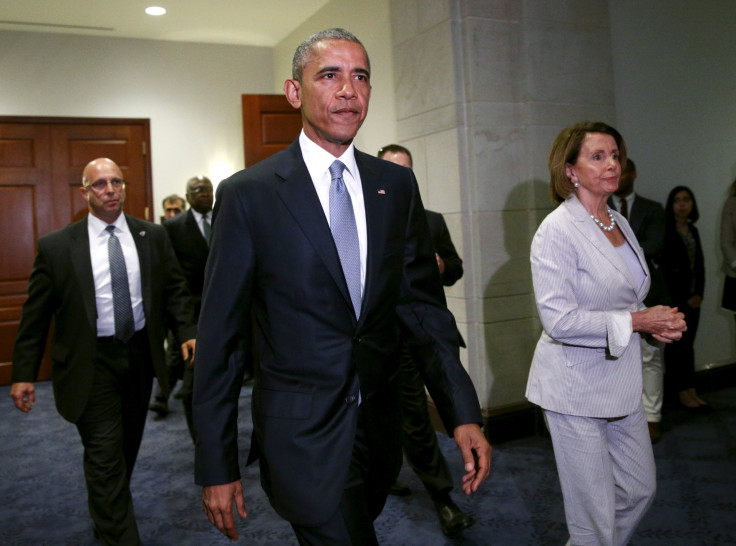
Congress Democrats roundly rejected a bill on Friday that would have helped the White House pass the Trans-Pacific Partnership (TPP), a free trade deal that’s unpopular among President Barack Obama’s own party. That was despite Obama’s efforts to court Democratic legislators at yesterday’s congressional baseball game and earlier on Friday on a rare trip to The Hill (in an impassioned speech, he basically asked Democrats to trust him). Obama argues that the TPP trade deal is essential for America to write the rules of global trade as China becomes a stronger force in the world economy. Democrats largely opposed the bill, in part because of proven and perceived losses in U.S. manufacturing jobs following other trade deals such as Nafta (The North American Free Trade Agreement). Meanwhile, most Americans don’t understand the bill (we’ll explain it below).
Getting legislators to accept the TPP would be tough enough, but Obama and Republican allies face another hurdle: they have to pass the bill in an up-or down vote or it won’t work. Any amendments to the TPP would have to be approved again by every other government; it would be total chaos. So Obama either gets carte blanche to negotiate a deal with each other partner, and then submit it for an up-or-down vote, or he get’s nothing. In order to secure this negotiating power, the President has lobbied heavily for the passage of two laws. The first -- Trade Promotion Authority (TPA), gives Obama negotiating powers. Democrats were pissed about TPA because they wouldn’t be able to attach amendments (that’s the up-or-down-vote part) to protect workers that might be displaced by TPP. Trying to find a compromise, legislators created the Trade Adjustment Assistance (TAA), which offered modest (and arguably ineffective) relief for displaced workers. That’s the bill that got shot down today in the House, after labor unions convinced Democrats that it didn’t go far enough or would be ineffective.
In review: because the labor compromise bill -- the Trade Adjustment Assistance (TAA) -- didn’t pass, Obama has a very small chance of passing the Trade Promotion Authority (TPA) -- the bill that he needs to negotiate and pass the Trans-Pacific Partnership (TPP), the proposed free trade agreement with Latin American and Asian countries that this is all about.
We won’t get too deep into arguments against TPP in this article, but check out some of the other articles we’ve written about TPP, which would affect countries like Mexico, Peru and Chile.
- Latino activists argue that TPP will hurt Latin Americans and increase the need for emigration to the U.S.
- Foreign governments like Peru and Australia are very concerned that TPP will increase the cost of healthcare in their countries.
- Elizabeth Warren and the Cato Institute warn that TPP would compromise national sovereignty and subsidize outsourcing.
Liberal Democrats from Elizabeth Warren to Nancy Pelosi do not want this bill. Obama thinks it’s a good idea. So do most (but not all) Republicans. Here are 4 reasons why.
Obama argues that the TPP is not Nafta: “In fact, this agreement fixes some of what was wrong with Nafta by making labor and environmental provisions actually enforceable,” he said in a speech at Nike headquarters in May of 2015. Critics argue that Bill Clinton made similar promises before Nafta was passed in the 1990s. Obama argues that also unlike Nafta, the deal doesn’t yet include agreements for increased visas for foreign workers. Republican supporters have tried to quell “rumors” that the TPP would be a Trojan Horse for immigration.
Strengthen The Middle Class: With the spectre of Nafta looming, arguing that TPP is middle-class economics has been a hard sell, but Obama has been doing just that. The trade deal’s increased intellectual protection laws would cut down on losses in U.S. exports, he argues. (Those are the same measures which Peru and Australia are concerned about because they include medicines). He also argues that TPP will increase demand for exports of goods “Made In America,” and chip away at America’s giant trade deficit. Most Republicans favor free trade, because traditional economists say that increased trade and competition create a net benefit for all countries involved.
Counter Chinese Economic Power: The TPP does not increase trade with America’s main economic rival, China. In fact, the free trade treaty can be seen as a collective move against China’s power. Here’s how Obama made the argument at his Nike speech:
“We have to make sure America writes the rules of the global economy. And we should do it today, while our economy is in the position of global strength. (Applause.) Because if we don’t write the rules for trade around the world -- guess what -- China will. And they’ll write those rules in a way that gives Chinese workers and Chinese businesses the upper hand, and locks American-made goods out.”
The countries are Australia, Brunei, Canada, Chile, Japan, Malaysia, Mexico, New Zealand, Peru, Singapore and Vietnam.
It’s Not Secret: Critics of TPP are uneasy about the deal because the current negotiations are secret. The final version won’t be, of course, but many legislators and activists are concerned that they don’t know what they’re signing up for if they support TPA. Obama reiterated the not-secretness of TPP on his newly opened Twitter account last week (@POTUS). Still critics asked that he release the entire text of TPP proposals, parts of which have already been leaked.
© 2025 Latin Times. All rights reserved. Do not reproduce without permission.




